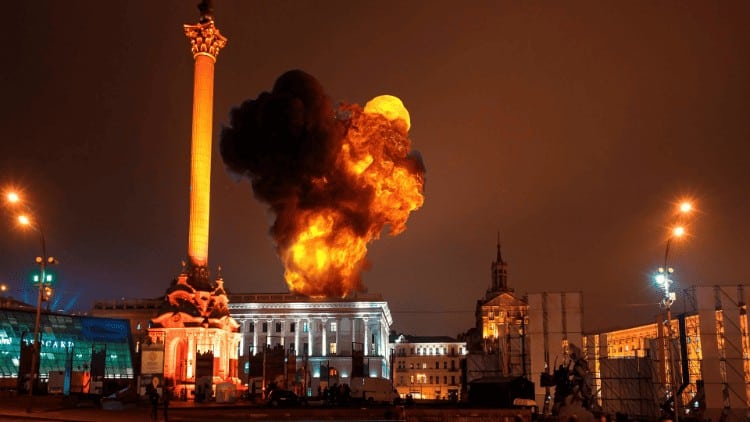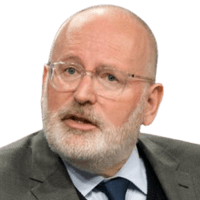The EU must not only ensure that Ukraine can attain a just and lasting peace but support the embedding of universal norms.

Russia’s war against Ukraine, as with almost all wars, will end at the negotiating table. But negotiations cannot start until Ukraine’s territorial integrity has been restored. Since a change of heart in Moscow is unlikely in the short term, the faster that Ukraine gets the means to force Russian troops to return to Russia and stay there, the better—for Ukraine and the rest of Europe.
We should all aim for a swift conclusion to the fighting. But, paradoxically, to bring about that outcome, we must make clear to the Russian president, Vladimir Putin, that we will stay the course, doing whatever it takes for as long as it takes, so that he sees there is no point in endlessly sending young Russians into the meat grinder that is the Ukrainian front.
Putin will not win this war. In fact, he has already lost it. But he could prolong it or create a semi-frozen conflict if Ukraine is deprived of what it needs to expel Russian forces. For any peace to last, it must be just. And to be just, it must respect Ukraine’s international borders, its democracy, its statehood and its right to choose its own destiny.
‘Total enemy’
This is crucial, because Russia’s justification for its aggression is based on the denial of Ukrainian statehood. Such claims are born of a Russian nationalist and imperialist ideology that rules out the very idea of a distinct Ukrainian identity. Russia defines Ukraine’s people as what the Nazi jurist Carl Schmitt called a ‘total enemy’, which must not be merely defeated but erased—not for what it does but for who it is.
This is Russia’s justification for torture, abduction of children, burning Ukrainian books and countless war crimes. The violence unleashed on Ukrainians because they are Ukrainians is comparable to Stalin’s great terror, when millions of innocent people were killed for being ‘class enemies’. Stalin’s terror ‘worked’ precisely because targeting innocent people forced everyone into total conformity with the will of the state. This is totalitarianism.
Having descended ever deeper into authoritarianism during the past 15 years, Russia has again become totalitarian. Anyone who does not comply runs the risk of being poisoned, falling from a window or ending up in prison. As the population is terrorised into conformity, already-vulnerable groups face the greatest risk of persecution. Anti-Semitism has exploded, sexual minorities are living in constant fear and racism and xenophobia are running rampant.
Under these conditions, it will take a long time for Russia to sort itself out, even if the man who has turned his country into a pariah leaves the stage. The detoxification of the Russian nation might take a generation and the outcome is far from assured.
Collectively, we must not only ensure that Ukraine can attain a just and lasting peace as quickly as possible. We must also support Ukraine’s efforts to transform itself into a prosperous country whose citizens can count on the rule of law, respect for human rights and fundamental freedoms. In this respect, the accession process leading to European Union membership can be transformative. Just as that process helped Greece, Spain, Portugal and central and eastern European countries detoxify from their dictatorial pasts, it can also inoculate Ukraine against a dictatorial future.
Sharp turn
Twice in my lifetime, history has taken a sharp turn and pushed Europe in a new direction. The first time was when the Berlin wall fell in 1989, allowing Europeans to reunite. The second was when Russia invaded Ukraine a year ago, forcing Europeans to defend and strengthen the values and institutions they hold dear.
Looking ahead, we must acknowledge that, under current circumstances, Ukraine’s integration with the EU will have to happen much faster than in the past. But that does not mean we should sacrifice thoroughness on the altar of expediency. A partial or flawed integration would leave shortcomings unresolved, ultimately weakening both Ukraine and the EU.
What is needed, then, is a Marshall Plan type of response. This would be unprecedented in scale, combining reconstruction and economic transformation with the legal, administrative and social reforms needed to enable Ukraine to function fully as an EU member state. This has never been done before but it will have to be done now.
One urgent task, for EU leaders and national politicians alike, is to prepare our citizens for what this transformation of both Europe and Ukraine will entail. In parallel, the EU must build the economic, financial, political and administrative structures that will be required.
Europeans caricatured
The Russian regime portrays Europeans as weak and decadent pushovers. ‘Gayropa’ must ultimately yield to the superior force of ultranationalism, Putin believes, and even had certain political camps in Europe and the United States convinced of this, with politicians and media personalities praising a ‘strong leader’ standing up for ‘traditional European values’. But the Ukrainian people are exposing the lies underpinning this caricature, putting Putin’s western admirers to shame.
We all need to recognise what is at stake. One hundred years after its first incarnation, totalitarianism has made a comeback on our continent. We must quickly contain and then unmask it, so that it can be defeated and finally expunged by the Russian people themselves.
This war is about so much more than gaining or losing territory. The Ukrainian nation, a European nation, is fighting for its survival. An imperialist ideology that denies other nations’ existence will not stop at just one. If Russia’s aggression is allowed to pay off, the flames of war will burn in more European countries and autocracy will spread like gangrene.
The past year has shown that we are much stronger than Putin and his ilk, so long as we are united and determined. So, let us take inspiration from the heroism of the Ukrainian people. The more we support them in their struggle, the sooner the carnage will stop.
Republication forbidden—copyright Project Syndicate 2023, ‘The only way to end the war’
Frans Timmermans is executive vice-president of the European Commission.

